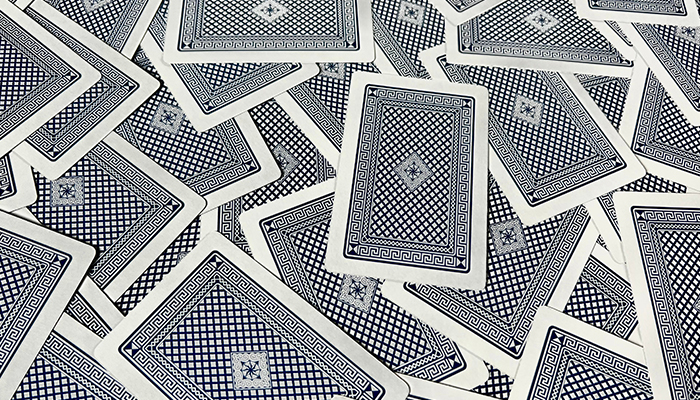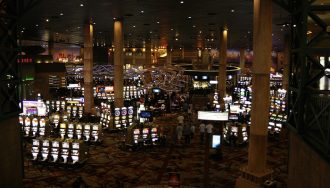Is Edge Sorting Cheating?
 Edge sorting
Edge sorting
Edge sorting takes advantage of asymmetry in the backs of playing cards and allows the player to turn certain cards one way and the other cards another in a way that allows the player to read the backs of the cards, and to have a very good idea of what that card is, without ever marking or changing anything about the card except which direction it is facing.
This is why the play was called the Turn by generations of card sharps who used it to beat poker games and even baccarat as least as far back as the late 1800s. And of course the new generation of the best blackjack sites online have nothing to fear from edge sorting since it needs to be done in person and won’t work on the internet.
Most rational people who understand edge sorting and how it is accomplished would tell you it is cheating in the sense that you’ve gained an edge over the house that you were never meant to have, and recent court cases seem to bear that out.
But they would also tell you that the burden is generally on the casino to protect itself and that edge sorting is not criminal behavior. And while, in cases that involve millions of dollars, some civil liability may hold, 99% of cases involving players who are using edge sorting are not prosecuted.
So, let’s take a look at what edge sorting is, how teams have used it to beat casinos for millions, and the legal fallout from recent legal cases involving poker legend Phil Ivey and the team that recruited him, as well as the dead simple way to eliminate edge sorting.
- 🂮 The Simple Basics of Card Edge Sorting
- 🂮 Phil Ivey and the Baccarat Edge Sort Exploit
- 🂮 The Courts Take on Edge Sorting
- 🂮 The Real Danger of Edge Sorting
- 🂮 Conclusion
The Simple Basics of Card Edge Sorting
If we look at the back of a casino playing card, we will see that they are often covered in geometric shapes, which are often asymmetrically cut, meaning perhaps if we have diamond shapes, that one side of the card has full diamonds along one edge while the other has only half of a diamond pattern along one edge. By turning all of the ten cards in one direction and all of the small cards in another, you could easily determine just by looking at the backs whether a card might be high or low.
You might assume that casinos and the printers from which they purchase their cards would make sure this isn’t an issue. A survey by mathematician and advantage play expert Elliot Jacobson concluded that as many as two-thirds of all decks at major Las Vegas Casinos were vulnerable to edge sorting.
Depending on the game and which cards were targeted for sorting, he concluded that players with perfect card knowledge of, say face card or not face card in some poker games, or six, seven, eight, nine, and then anything else in Baccarat, could lead to advantages as high as almost 7% in Baccarat and a staggering 61% in games like Mississippi Stud where all three dealer cards are exposed on the board.
Considering that even the best card counter can only usually get a 1% house advantage, it’s no wonder advantage players seek out or in the case of the truly audacious, create conditions where they can put this technique to use.
Phil Ivey and the Baccarat Edge Sort Exploit
Despite many breathless stories about the Phil Ivey incident in major news outlets edge sorting is almost never seen in Baccarat. Perhaps that is why it worked to his advantage at not only Crockford’s in London, where he won 12 million US, but also at the Borgata in Atlantic City where he picked up another 9.6 million US, and Foxwoods in Connecticut, where his partner Cheung Yin Sun won a meager 1.1 million US.
It’s quite likely these two, as well as Ms. Sun’s own team led by notorious advantage player Steven Black, beat other casinos as well, but these three are the ones who filed suit, so they are the ones we know about.
First, let’s talk about a normal casino baccarat game. There are two types: Big Baccarat which will seat 14 or more players and has several dealers, and midi baccarat which seats 8 players. In both of these games the players are allowed to handle the cards but these cards are destroyed after each shoe and new cards are used, which sort of precludes edge sorting.
Then in Mini Baccarat, the cards are often reused, but the player never touches them, only the dealer. And of course as previously mentioned online baccarat is immune to edge sorting for obvious reasons. So how was this team able to use edge sorting on baccarat? Easy, the casinos got greedy and thought they saw suckers instead of sharps.
Ms. Sun had a reputation before this whole affair as a jetsetter with rich Chinese parents and spent most of her twenties blowing large amounts of money in casinos from Macau to Monte Carlo, while Mr. Ivey has 11 WSOP bracelets and is considered by many to be the best poker player in the world, he won over $20 million playing at Full Tilt and other top online poker sites and he also likes to engage in less advantageous games at high stakes.
So if you and I asked the dealer to turn the sixes, sevens, eights and nines one way before adding them to the discard, they would laugh in our faces, and if we then asked that all four cards be dealt out and laid face down on the table before we bet, security would be on their way. But if you have millions of dollars on deposit, that is exactly what they do.
This is how some of the biggest casinos in the world get taken for tens of millions of dollars in a scam that is at least 130 years old, and the exact reason why so many safeguards are in place on the game to start with. It’s inconceivable and defies reason, but that is what happened. And why it is very unlikely to ever happen again, though Ms. Sun has said in interviews that she continues to destroy baccarat games in the Asia market, so who knows for sure.
The Courts Take on Edge Sorting
Crockfords, Borgata, and Foxwoods all took the humbling step of airing their errors in court, and after three long court cases and several appeals, we have the result that seems more than obvious. Although in the Foxwoods case it was more about the fact that Ms. Sun lacked standing to sue a sovereign Indian tribe in federal court.
Both in the Crockfords case and the Borgata case, the court ruled that while edge sorting was not a criminal act, it was cheating under civil law and therefore Crockford was able to avoid paying Mr. Ivey and Ms. Sun. Borgata was allowed to sue for damages to retrieve funds it had already paid out to the pair.
Yet edge sorting teams continue to hit blackjack, Mississippi Stud and other casino games with attacks regularly, yet where are the lawsuits there? It would seem that either the sheer volume of the losses or the extreme lengths that the couple went to are what caused allegations of cheating to be made, and for this team to be singled out from a dozen others that still operate around the country. Not the fact that the casinos broke both their own procedures as well as those laid out by the New Jersey Gaming Enforcement division, in order to have a chance at winning the teams millions in “easy” money.
The take away is that edge sorting is not criminal behavior under any means, and that only under the most extreme circumstances and losses will casinos resort to civil action, at least in the UK and the US. What courts in Macau or other countries might decide is yet to be determined.
The Real Danger of Edge Sorting
Without dealer collusion or social engineering of the game rules, baccarat is not a good target for edge sorting despite the thousands of articles saying otherwise. Nor is shoe blackjack, as the players can’t touch the cards and the dealer places them in the shoe.
Poker is also difficult to edge sort, only because poker cards used in commercial poker rooms don’t often have the same geometric patterns as blackjack cards and because cards are thrown into the muck by other players negating the edge sorting. Edge sorting poker games might be best left to home games, especially ones where you can more easily control the muck by asking the players to just set their hands down.
Double deck and even 6/5 Single deck blackjack can be susceptible to edge sorting, especially the 6/5 games, because the advantage the house picks up from only paying 6 to 5 on blackjack means counting these games isn’t worth the time and the casinos knowing that doesn’t spend as much time monitoring these “sucker” games. Some teams have targeted 6/5 games believing that edge sorting blackjack on games with little heat is a winning decision, often with more than 5% player advantage.
But the real dangers of edge sorting becomes evident with carnival games like Mississippi Stud, where if you can only see the dealers three cards, the player advantage goes as high as 61%, or Three Card Poker where if you can see all the dealers cards the advantage over the house is over 16%. Surprisingly, Let It Ride only offers a 2% player advantage, even with both dealer’s cards being seen.
Conclusion
Edge sorting in this day and age shouldn’t even be a thing. A simple breaking of the deck into two equal parts, then turning one half of it 180 degrees before riffling them back together again stops the whole thing cold. Or better yet perhaps buy cards from reputable companies that don’t leave asymmetric patterns on the back of your playing cards.
To accuse people of cheating or worse yet drag them into court when all they’ve done is turn the cards you provided them to play with one way or the other, seems the height of lunacy. Let alone agreeing to make those turns for a player who can’t even touch the cards and then getting beat for 10 million dollars before realizing that you’ve fallen for one of the classic blunders, and now need to run to a judge because you can’t be trusted to run a simple card game.
In any case the courts have spoken in the US and the UK, and while not criminal, turning the cards this way or that to gain an advantage is a civil liability that the casino can turn to when they wish.




